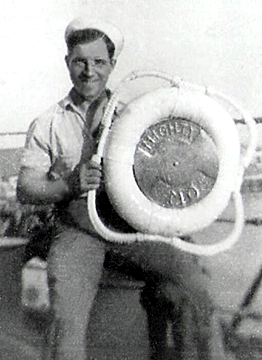YESTERDAY, TODAY, AND FOREVER
By Elena Santangelo
Excerpt
How this book came
to be
 One
evening I found my mother settled in her recliner, reading a small
hardbound book. Since my mother never read anything but the newspaper
and an occasional magazine, I asked her what the book was. She said,
"Uncle Joe's diary that he kept in the war."
One
evening I found my mother settled in her recliner, reading a small
hardbound book. Since my mother never read anything but the newspaper
and an occasional magazine, I asked her what the book was. She said,
"Uncle Joe's diary that he kept in the war."
I was astounded. For one thing, Uncle Joe had been dead six years, yet
this was the first I'd heard of a diary. I asked where she got it. She
said that she found while we were cleaning out his house, right after he
died. She'd brought it home, tucked it carefully into a drawer, never
looked at it. Now, as she sorted through old photos and other papers,
she'd come across the journal once more, and this time decided to read
it.
I understood she needed a few years' distance to be able to open it.
She'd dealt with her brother's mental illness from the end of World War
II until the day of his death, fifty-four years later. As for me, I
found it difficult to picture him keeping a journal at all.
When I was a kid, we'd visit my grandmother every Sunday night. Grandmom
would give us food—homemade pizza or cookies or the like—and we'd all
sit and watch Lawrence Welk on TV. All except Uncle Joe, who would pace
the length of their tiny row house the whole time we were there.
His gait was moderately slow, with a sway caused by a micro-moment's
hesitation before putting his weight on each foot. One hand was usually
tucked into a pants pocket. From the other, hanging down at his side,
always dangled a lit cigarette. In good weather, when the doors were
open to let in the breeze, he'd stop for a second at either end to take
in the view through the screen door, but otherwise, the rhythm of his
pacing only faltered when my grandmother told him to drink his coffee.
A cup of it, pale with milk, would be sitting on the table, cold by the
time we arrived. Uncle Joe would pause for a sip, or to chug the whole
cup, then resume his pacing.
Sometimes he would chime in on the conversation with a sentence
fragment, never participating for very long, never making eye contact.
His comments were usually gruff and opinionated, or hesitant stutters,
without much middle ground.
When I was old enough to realize this wasn't considered normal behavior,
and that men in their forties are expected to have jobs and not live
with their mothers, I asked my mom what was wrong with Uncle Joe.
"He was in The War," she said.
<
Back
to Yesterday, Today, and Forever description

